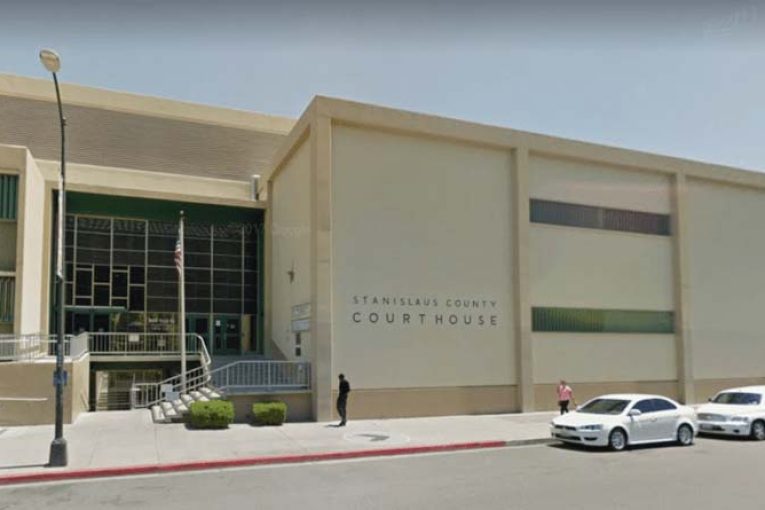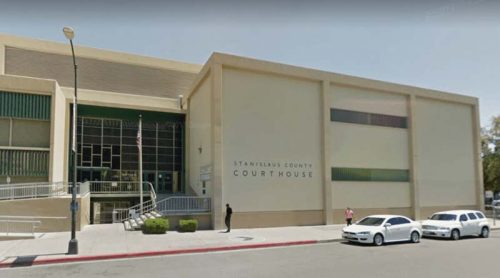

By Audrey Sawyer
MODESTO, CA – A hearing for a contested violation of parole for a man who had pleaded no contest to a felony violation (sexual misconduct with minors) for 12 years took place here in Stanislaus County Court Tuesday—in the end, the judge wanted to take more time to study the opposing arguments.
The hearing concerned one condition involving websites the accused is or is not allowed to visit, and the contention by the defense that a portion of the condition is unconstitutional.
Laci Anderson, a witness and parole agent, told the court about a specific condition for the accused that requires him to “not use excess social media sites or networking sites, cannot use computer or cellular instant messaging systems, such as Facebook, Twitter, Snapchat, KIK, or Tumblr without permission.”
After a cellphone search of the accused by an officer, she said she saw there was browsing history on one dating website, which would be a violation of the agreed upon condition to which the accused had signed. The messaging history between the accused and the named individual was seen, and the accused had provided the same phone number on file for him.
Deputy Public Defender Reed Wagner clarified with the parole officer that special conditions are associated with limiting dangers and are meant to ensure rehabilitation.
While DPD Wagner noted Facebook, Twitter, Snapchat, and others can be applications which children are present on, he asked the parole officer if any of those previously listed websites are found in the accused’s browsing history.
Parole Officer Anderson confirmed the accused was not seen using other sites aside from the dating one, and told the court she does not know if the dating website has an age requirement, admitting to not being that familiar with dating websites.
The account of the accused was not anonymous, stated DPD Wagner, with both pictures of the accused and his phone number provided. DPD Wagner added anything viewed would be considered adult content, to which the parole officer answered that it would be illegal if there was content of minors.
Deputy District Attorney Sameer Shukla inquired about the name on the profile the accused used, and it was established it was the accused’s middle name.
Responding to defense, DDA Shukla said, “This condition clearly states that one shall not use or access social media sites, networking, peer to peer networks, or cellular or instant message systems. Evidence clearly shows that the accused is in violation of that, he has an account associated with his face, his middle name. There is browsing history and evidence that he visited this dating website, he has been using a number that an agent has identified as his. I’d ask that the accused be found in violation of probation.”
DPD Wagner argued, “The condition is a two-part condition. One is about anonymous browsing, the other is about accessing social media. We are just talking about accessing social media sites. The parole officer had testified that these specific conditions are tailored to each individual, and all of this involves sites which children can be present on. This is clearly not that site.”
DPD Wagner added “dating sites” ought to be considered differently from the other listed sites underlined in the condition.
Wagner noted, “There are two possible outcomes here. One is that adult dating sites are distinct (not included in the same group as Facebook, Twitter, Snapchat, etc) in that having minors on them would be a violation of a law. There is a separation, minors can have Facebook accounts. It is clear the parole condition is designed to limit my clients contact with children, particularly online and anonymously.”
DPD Wagner claims if dating sites are not considered distinct, he believes it fails under a constitutional challenge, citing a case to indicate a parallel to his current one
Quoting from People v. Gruis (2023) the DPD said, “Courts found the pornography in that case to be overbreadth. Some of the language and that arguments apply to this condition if this condition is inclusive of adult dating sites, similar to that case. If this condition is not inclusive of adult dating sites, which I don’t think it can be in order to be a special condition relating to prohibiting communication with children, then clearly we don’t have a violation.”
DPD Wagner suggested: “Case law specifically states that a condition that imposes on a person’s constitutional rights must closely tailor limitations to the purpose of the condition. Here, around a paragraph in that case prior, states sexually explicit material when in the possession of ordinary adults has First Amendment protection.”
DDA Shukla told the court he could not think of any case that would make the accused’s condition unconstitutional, and he argued that the case brought up by defense was specifically about pornography.
The prosecutor added, “I think a distinction of the condition that can be made, prohibits use of social media of sites that can be assessed by minors and by children. I don’t think there is sufficient case law to declare it unconstitutional, as void for vagueness.
“The other thing is that you don’t access those sites to navigate the internet anonymously. This is a dating site where the accused can put his picture up, put his middle name (even if it is his middle name) in a way parole people or other users cannot identify him. People wouldn’t know he’s a registered offender. He’s in clear violation,” the DDA said.
DPD Wagner briefly chimed in to add that the condition does not say that people can identify by registration, and that his issue is with the first portion of the condition, and not the second half.
However, DPD Wagner did respond to DDA Shukla by stating that the prosecution’s comment on how court doesn’t have enough to go off of, noting, “One thing referenced in that case is that the court does have the power to modify conditions, essentially what I’m arguing, this condition cannot include adult dating sites and remain constitutional.”
While Judge Dawna Reeves told both attorneys she is looking over the cited Gruis case and its conclusions and notes briefly, it is 15 pages, and said, “Seems the issue in that case, the vagueness challenge comes to what is pornography? It seems to be here unless the accused is told what is pornographic, certain works of art can be included. Seems to me that the case resolves the vagueness of the term pornography, born from some other cases that make that reference too nebulous for that to follow.”
DPD Wagner indicated to the judge he was referring only to a portion of that, and that he was referring to whether the condition is overbroad.
In response, Judge Reeves asked for further clarification: “What I understand you saying is that the accused’s situation is similar to Gruis’ condition, as his and both are overbroad, as that one is overbroad as pornography cannot properly be defined as overbroad.”
DPD Wagner explained, “Overbreadth by condition is not narrowly tailored to what is designed to prevent. They state ‘in light of conclusion, it must be vacated because of the vagueness that we don’t need to reach the merits” portion that discusses what an overbroad or not overbroad condition would look like, that is the part I’m looking towards.”
DDA Shukla added that the section at the time seems like an overbreadth part, not really what’s driving the issue.
Judge Reeves admitted it was the first time seeing the case and she wanted time to look it through thoroughly, noting, “We can fight about it. I’m not making a decision on the fly if he thinks (defense) I have not understood his argument. I want to make sure I read the entire case.”
All parties agreed to return this upcoming Friday for further discussion.